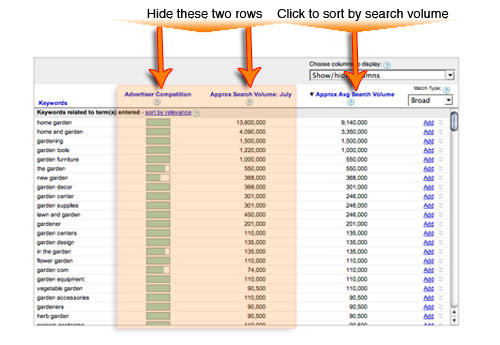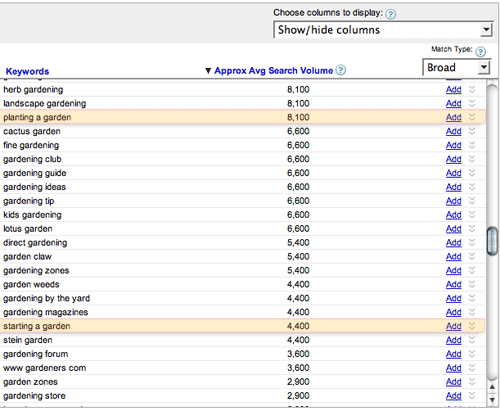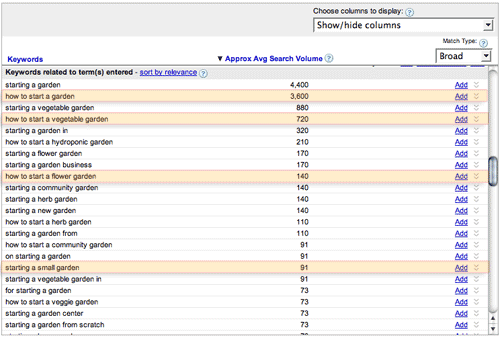Choosing the right keywords for your audience development efforts with Google’s AdWords Keyword Tool.
Depending on the status of your website, you may need to find niche terms in order to get a decent rank in search engines. If you’re Harvard Law School, you can probably go after broad keywords like “negotiation” (they show up 7th in Google), but if you’re not Harvard, you’ll have better results going after three to four keyword terms.
Three to four word keyword terms are niche terms that may get searched for less in Google, but if you are looking at the long tail, they have plenty of opportunities to drive your site traffic over time, especially when you land on page one with your blog post.
In choosing the name for blog post, you should try the Google AdWords Keyword Tool (which now shows actual metrics for search volume instead of just a picture). The Google Keyword Tool is now the most accurate way to start with a term like “gardening” and come up with an editorial calendar that includes articles with niche keyword phrases like “how to start a flower garden” and “how to start a hydroponic garden”. Both, as we discovered, are likely to get you on page one in Google due to the less competitive nature of those exact terms.
[text_ad]
How to choose keywords with the Google AdWords Keyword Tool
Say you are a gardening publication and want to write an article on how to plant a garden. “Holy Crap! Gardening Rocks!” might intrigue people who are already reading your blog, but using a title relevant to people who search for your topic means you’re your article will get found and read more often than just the first day it showed up on your blog with a catchy title.
Instead, you should use the Google AdWords Keyword Tool and start with your most basic keyword—then build from it. Let’s do a quick test on the word “gardening”:

Choosing the right keywords is the next step in this process. The Google AdWords Keyword Tool will always give back 150 results of related keywords, including the approximate average search volume (that’s the line you want to look at).
Sort your list of suggested keywords by clicking on “Approximate Average Search Volume” which should give you a keyword list in order of searches. You can choose to hide “Advertiser Competition” and “Approximate Search Volume for the month” inside the tool, as it can get confusing to have all three visible.

You can pick the keyword phrases that sound niche enough for your article, then Google them with “quotes” around the term.
By doing this, you will find out how many pages on Google are already using that exact keyword phrase. This will tell you what your chances are of getting onto page one using the phrase.
In this case, these were the keywords we chose to compare:
Planting a Garden
8,100 searches in Google (per month)
83,700 pages in GoogleStarting a Garden
4,400 searches in Google (per month)
26,300 pages in Google

These are both pretty broad keyword phrases, but if you wanted to end your search here and you were fairly confident in your status, you would choose “starting a garden” because it has much fewer pages in Google to compete with.
If you wanted to get even more niche, you could then enter “starting a garden” into the Google AdWords Keyword Tool which will give you even more keyword suggestions. In this case, we chose:
How to Start a Garden
3,600 searches in Google (per month)
28,700 pages in GoogleHow to Start a Vegetable Garden
720 searches in Google (per month)
6,530 pages in GoogleHow to Start a Flower Garden
140 searches in Google (per month)
863 pages in GoogleStarting a Small Garden
91 searches in Google (per month)
86 pages in Google

After going through two rounds of searches, we’d have stuck with “starting a garden” for the blog title since it has a fairly good ratio of searches to pages on Google. “Starting a small garden” would also be a good target in the long tail based on how few competitors it has, and especially if you are a small site with little search engine exposure already.
With this new list, you can not only name your blog post effectively, you can now start building a keyword list and strategizing your editorial calendar.
Don’t just discard the rest of your results though, because now you’ve started to find niche keyword phrases like “how to start a flower garden” and “how to start a vegetable garden”. There are plenty of others too, like “how to start a hydroponic garden” (210 searches, 250 pages).
While clever headlines might momentarily shock and amuse readers for the moment, titling your blogs and articles with phrases that your users are searching for is better in the long run.



Show. First I access tool is the Google Keyword Planner. Without him I don’t even begin to write my articles. Thank you very much.
I’ve got a question, I am curious to know which of these have better rank in Google SEO ‘-‘ or ‘|’. I have read different views on them and I am pretty confused. Hope you can clarify them! Thanks
I read many of blog post on this topic but they way you represent and give example with Google ad-word tool. Its really helpful and i completely understand your point. Thanks
Hi,
I was searching for the ” How to choose article titles for your sites ” in the search engine(google) and found what i want to know here!
thanks a lot for your article which has given me the useful information.
All the best!